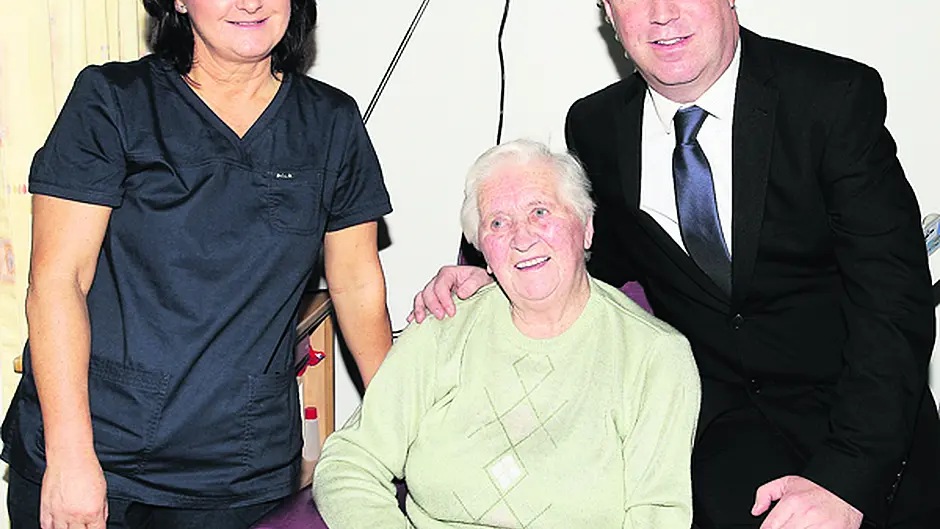An innovative plan to move recovering patients from CUH to Clonakilty is bearing fruit, reports Emma Connolly
An innovative plan to move recovering patients from CUH to Clonakilty is bearing fruit, reports Emma Connolly
‘THEY had my tea ready for me when I came off the ambulance – the care I’m getting here is second to none, absolutely splendid.’
That’s the resounding vote of confidence from 84-year-old Mary Cross who was the first CUH patient to be transferred to Clonakilty Community Hospital to continue her recovery in one of the West Cork facility’s new transitional beds.
In a fresh initiative spearheaded by Junior Minister in the Department of Health, Jim Daly, and reported recently in The Southern Star, Clonakilty has opened up these news beds for low-risk patients from both CUH and Bantry General Hospital, to free up space for more serious cases and to ultimately help solve the national trolley crisis.
There’s an average of 30 people in CUH every day that don’t need to be there, but for a variety of reasons, including waiting for a care package or alterations to their home to be completed, have no other option.
These 14 transitional care beds (which can be increased to 16 if necessary) are intended as a solution. Some 12 are ring-fenced for CUH patients and two for discharges from Bantry General Hospital.
When The Southern Star visited recently, eight beds were occupied by patients which included Mary Cross from Coppeen, who was admitted on December 19th. She said she was delighted to be given the option to be transferred to Clonakilty and encouraged other patients to consider it.
She suffered a fracture to her hip and was attended to at home by Dr Jason van der Velde of West Cork Rapid Response, before being taken to CUH where she had surgery the next day and is now recovering in Clon.
The key to this initiative’s success, the HSE and Minister Daly stress, is that patients come to Clonakilty with a discharge date and a destination to ensure the flow continues through the system.
How it works is that Noreen Murray, continuing care placement co-ordinator, visits appropriate patients and gets their consent on site in CUH.
‘Appropriate’ is the key word here – in other words, someone who is still acutely unwell or who will require an x-ray the next day won’t be an option, she says.
There are strict criteria to be met and all patients deemed suitable for Clon have already been medically discharged, which means that effectively the treatment they will get could be administered at home.
Carol McCann, director of nursing in Clonakilty, explains that one of their patients is recovering after an orthopaedic injury and is in need of rest while he waits for a homecare plan.
Other patients include one recovering from a coronary bypass, and another from a cardiac stent procedure. Primarily, patients are from the West Cork hinterland, so far Enniskeane, Drimoleague and Rosscarbery, but there have also been patients from Glenville and Cork city.
Patients cannot be forced to come to Clonakilty – for some it may seem like a million miles from their CUH bed.
Minister Daly said a suggestion to some people to transfer to the West Cork town may come as a shock, but has appealed to people to give it consideration.
‘There needs to be a change in the mindset of people for this to work,’ he said.
And he hopes to see this model replicated further.
‘There are 129 community hospitals in the country; they don’t all have the capacity or are in the right location to do this, but 10-20% could have the potential.’
In Clonakilty, there’s an eight-bed ward of transitional care beds in the hospital, with the other spaces dotted throughout the facility with potential to also care for patients with cognitive impairment.
The buy-in of staff, and local GPs, has been crucial to the project’s success so far, with everyone praised for stepping up to the challenge.
GPs would have already been used to working with short-term patients in the hospital and the introduction of the transitional care beds just means there’s more of them. Nonetheless, their support has been noted.
Clinical nurse manager Siobhan O’Regan said the new departure has brought greater challenges, but has been very rewarding.
‘It’s changed the dynamic of the hospital; it’s very satisfying to help support people to get them home. It’s also a good use of our skillset.’
Three additional healthcare assistants have been appointed to meet the additional demands of the transitional care beds, and there’s also a plan to hire a physiotherapist and occupational therapist to provide 20-hours cover a week.
Carol said: ‘That would help keep people well and active, and keep the idea that they are here for rehab very much in people’s minds.’
So, for now, the plan is to continue as is.
Deputy Daly said: ‘This is effectively a trial – it’s not set in stone.’
Carol added: ‘There is a level of demand, but it’s early days and needs more time to see if it’s something that can be developed. But we’re delighted to play our part.’
The message all involved want to get home is that Clonakilty is part of the journey, but is not the destination.
Mary will agree it’s a pretty good stop-off point. And in another endorsement of the excellent care received while at the hospital, a transitional care patient who has been discharged has made enquiries to return as a long-stay patient.








